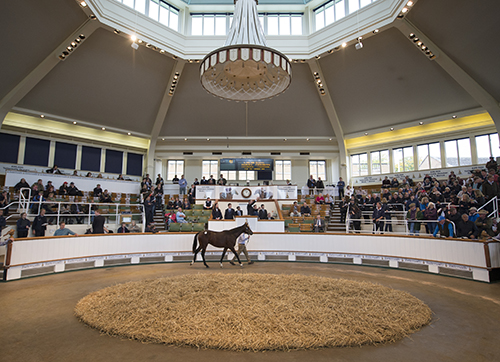By Jack Cantillon
We are in the midst of a global pandemic unprecedented in modern times. The global stock market is plummeting. Lives are being lost before their time right across the globe, numbers compounding by the day. A trivial question emerges–but an acutely important one for those in our industry–who is going to buy our horses?
The global financial crisis saw yearling prices drop more than 40% overnight. It's not unrealistic to see a similar drop this year and we need to face that reality now, not later. However, there is a difference. The collapse of Lehman Brothers into bankruptcy, seen by many as the tipping point of the global financial crisis, took place on Sept. 15, 2008 in the middle of the Northern Hemisphere sales season.
Today, we're seeing the first flowers of spring. If we proactively plan for the worst now, we have a chance to protect our industry from the challenges when our yearling sales begin: indeed, with agility planning we could assist our breeze-up consigners. We need ideas. Horses are, of course, bred in crops two years in advance. We have our supply, we now urgently need to fix the demand.
All industry participants are affected by this loss of demand. I believe we need a Thoroughbred COVID-19 co-operative to protect our participants. A co-operative is a private business organization that is owned and controlled by the people who use its products, supplies or services. The goal of the co-operative would be to help as many industry participants as possible to protect our industry, and keep it resilient for when–and it's when, not if–the brighter days return.
The co-operative would work as follows:
- owners submit their horses to the fund for assessment;
- auction houses independently value the horses, thus utilising their integrity and market knowledge while complying with any social distancing measures remaining in place;
- breeders receive a share of the co-op relative to the value of horse(s) submitted;
- trainers tender for the training of horses with their veterinary, farrier and transportation partners;
- crucially the industry seeks government support for the project to protect livelihoods in acutely important rural industry and take advantage of the available unprecedented crisis funding in a professional manner;
- build a first-in-class digital product for managing, following and enjoying the portfolio;/li>
- a dedicated welfare plan is put in place for the animals as a central aspect to management;/li>
- shares in the co-op are offered in two manners to the public:
1) an equity interest in a prudently managed Thoroughbred portfolio at the bottom of
the market curve that can offer prospective gains to investors in the
coming years with a potential governmental incentive; and
2) a lease interest to those that wish to enjoy
the experience of horse ownership
across a portfolio of horses that would
not previously have been available,
allowing them to support our industry
in a time of hardship–such lease
holders receive incentives from
racecourses bringing them closer to
the sport.
- bloodstock agents are incentivised to manage, market and sell the horses as the market improves in 2021 and 2022.
This is, of course, in parallel to the traditional sales structure. However, it is designed to be complimentary by involving auction houses for their integrity function and their appraisal knowledge. The reduction in supply of yearlings at sale will sustain acceptable median and average figures, which underpin our equity value of our bloodstock.
We should look at the examples already in place such as Art Basel Hong Kong which, after canceling its fair, will present more than 2,000 works online with an estimated value of $270 million. It is also predicated on this virus ending–which it will. It's hoped that the economic damage is not a systemic economic failure and that economies can rebound in 2021 and beyond.
Of course, given a choice today, I would rather be selling a horse in 2021 than in 2020 but we need to protect our product and the current crop of yearlings grazing in the paddocks.
In times of crisis–agility, innovation and cooperation, not perfection, are the tools we need to get us through this grave challenge together. We need to start the conversation and begin the planning. As we sit inside, those conversations need to start now. Let's stay healthy and together, we can find ways to keep our industry healthy too.
Not a subscriber? Click here to sign up for the daily PDF or alerts.






